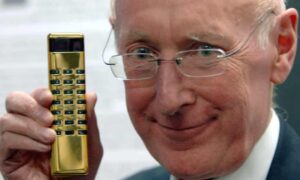
Sir Clive Sinclair, who has died aged 81 from cancer, was the inventor who brought pocket calculators and the earliest cheap and accessible miniature computers into British homes in the 1980s.
For a few years he seemed to be the epitome of the new hi-tech, go-ahead Britain the Tory government was striving to promote. He was made businessman of the year, knighted, championed by Margaret Thatcher and became, briefly, a multimillionaire. But, proving a better inventor and self-publicist than an entrepreneur, his reputation came a cropper in 1985 with the invention of the C5, his prototype electric car.
The three-wheeled, low-slung, lightweight, open, plastic-sided vehicle, retailing for £399, whose top speed was 15mph and whose battery needed recharging every 20 miles, was rushed into production, with Sinclair predicting annual sales of 100,000. But its flaws were only too evident and it sank under gales of derisive media laughter. Journalists had been led to expect a full-sized vehicle from the genius inventor, not a tricycle with a modified Hoover washing machine engine.
Marketed with the slogan “A Whole New Way to Get About”, it was damned with faint praise by the Department for Transport, which said: “As an alternative to pedal cycles it is not thought likely to have a worse safety record.” But drivers felt vulnerable, not only to passing traffic but to heavy breezes and gusts of rain, and only a few thousand were ever sold. Within months Sinclair was forced to sell his computer company to Alan Sugar, the owner of Amstrad, close the office headquarters in Cambridge and lay off virtually all the staff.
Many years later, Sinclair admitted that January had not been the best time to have launched the C5, as its batteries tended to pack up in cold weather. “It was a good idea then and now,” he told the Independent on Sunday in 2010. “We sold quite a few thousand and people loved them, but clearly I should have handled it differently. It could have succeeded. I rushed at it too much.”
Sinclair was the son and grandson of engineers, the eldest of three children of George Sinclair, a mechanical engineer who had his own machine tool business for a time, and Thora (nee Marles). Born in Richmond, Surrey, early in the second world war, he had his childhood disrupted, first by evacuation to Devon with his mother and later, after the collapse of his father’s business, by moves to different parts of the south of England, where he was educated at a succession of private schools. His enthusiasm for inventions started early – apparently because of an inventor character on the children’s radio programme Toytown – and by the age of 12 he had designed a one-person submarine out of a petrol tank.
Leaving St George’s college in Weybridge with two A-levels, in maths and physics, he decided not to go to university. Instead he found a job, initially on the trade paper Practical Wireless, before going on to edit electronics handbooks and becoming technical editor on the journal Instrument Practice.
